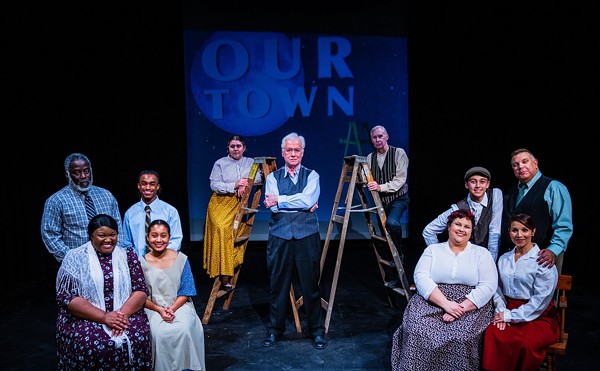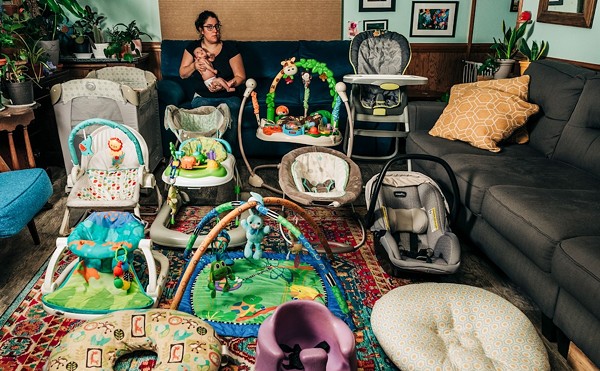If you have a daughter age 14 or younger, you can do her a favor by taking her to see Little Women at the Salerno Theatre Company. Even though this production has its share of flaws, the feminist message that it sends — that it's all right for a girl to be more focused on personal achievement than on romance and marriage — is presented so effectively, it's bound to have an effect on young minds searching for their own direction. As for adults, well, there's nothing terribly wrong with this musical, even if its relationships are in every sense pre-modern, and its most extreme moments have all the daring of a Harlequin novel. The show's melodies are harmless — they have that McMusical familiarity that's neither offensive nor memorable — and the dialogue, by Allan Knee, is moderately successful in an anodyne way.
But as a political statement — and I mean this without irony — this is a useful work of theater. It places stage center a young woman of pluck and ambition, and it makes it clear that her aspirations are not only acceptable but also praiseworthy. That's not a bad message in our highly sexualized culture, whose poster girl to young femmes is Miley Cyrus minus her clothes. And really, who would you prefer to be shaping your kids' psyches: Louisa May Alcott or Britney Spears?
The story that the musical tells is a pared-down version of Alcott's, with Jo March's attempts to become a published author as the throughline all the way to the climax. As in the novel, Jo has three sisters: Meg, Beth and Amy. It's the 1860s, and the four girls' father is an Army chaplain, away in the Civil War but never far from their thoughts. Their mother Marmee looks after them, but they're also impacted by other adults: Professor Bhaer, who gently criticizes the sensationalism of Jo's writings, Aunt March, who's looking for a prim companion to accompany her to Europe, and rich Mr. Laurence, whose piano is deeply admired by talented Beth. Then there are the suitors: John Brooke, who begins courting Meg moments after meeting her, and "Laurie," Mr. Laurence's grandson, who is accepted into the group as "the brother we never had," but sets his more-than-brotherly sights first on one sister and then another.
There's a ball to go to, scarlet fever to contend with, at least one act of petty sibling rivalry and another of sisterly heroism. But through it all, it's Jo's story that dominates. She's an aspiring author who writes blood and guts thrillers that nobody will publish, and a fierce individualist who wants to be prized for the quality of her character, not the look of her dress. She insists that she'll never marry — don't take this too seriously — and is more likely to challenge a suitor to a skating contest than to accept his protestations of love. As played by the delightful Rachel Brinker, she's brash and irrepressible and more fully human than anyone else on stage, with the possible exception of Marmee. She has something still to learn, though, and it's about a sort of literature that she begins by ignoring. Once she learns it, she flowers. She's clearly Alcott's fictional stand-in.
There are a few other fine performances, and several that suggest community theater rather than the professional stage. As Marmee, the impressive Janine Hartfield is loving and lovingly authoritarian, amused by her daughters' differences and entirely convinced that she possesses their love. Further, Hartfield, like Brinker, has a strong singing voice. Also affecting is Hilary Kraus, who as sister Beth is sincere and shy, passive where Jo is active, but brimming with filial affection. Catherine Burns as Meg doesn't have much to do, but does it effervescently, and Michael Mathews as John Brooke is a convincingly earnest young man who knows what he wants and instantly sets out to get it. But Heather Klein is out of focus as sister Amy, and Mary Trzcinski as sour Aunt March is too inward to reach past the footlights. Most of the other performances come across as amateurish, as do the seldom-felicitous period costumes designed by Eloise Allegretto and Michele C. Matthews. Another problem is Michael Mathews' set, which, while featuring an attractive landscape on the backdrop, also includes pieces of furniture covered and re-covered with white sheets in order to suggest scene changes (doesn't suggest them). Derek Baxter directs likeably, though: he clearly shares Knee's respect for Jo, and understands her predominance over the other characters.
And this is Jo's show. She's out of New England Transcendentalism crossed with Betty Friedan, and she's a joy who'll insinuate herself into your heart by play's end. Salerno's production is of mixed success, but Jo's strengths are unmitigated. So bring your daughters, your nieces, your grandchildren and little sisters. And tell them to watch for the little woman with the fire inside.
















